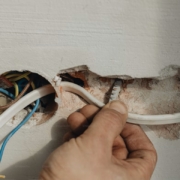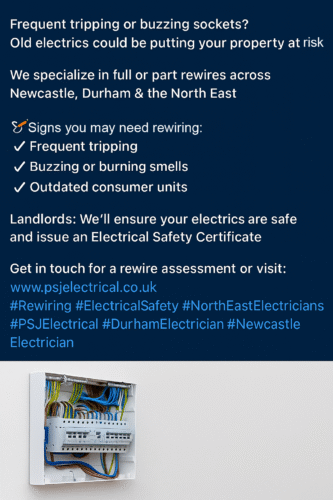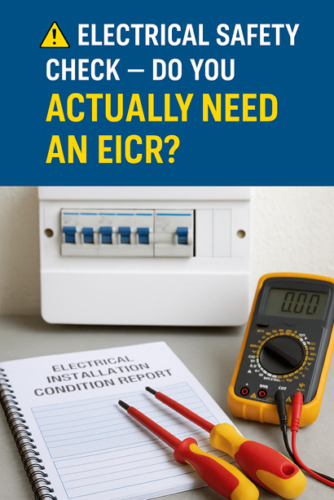Electrical Glossary: 20 Terms Every Homeowner Should Know
Electrical Glossary: 20 Terms Every Homeowner Should Know
Whether you’re planning a renovation, getting an EV charger installed, or just trying to understand what your electrician is telling you, electrical jargon can feel like a foreign language. That’s why we’ve created this plain-English glossary of 20 essential electrical terms every UK homeowner should know.
From consumer units to RCDs and EICRs, understanding the basics will help you make informed decisions, ask the right questions, and keep your home safe.
- Consumer Unit
Often referred to as a fuse box, this is the central hub where electricity enters your home and is distributed to different circuits. Modern consumer units include circuit breakers and RCDs.
- RCD (Residual Current Device)
A safety switch that automatically shuts off electricity if it detects a leakage — for example, if someone touches a live wire. All modern consumer units should have RCD protection.
- MCB (Miniature Circuit Breaker)
A modern replacement for fuse wires. MCBs trip when there’s an overload or short circuit, cutting power to the affected circuit.
- EICR (Electrical Installation Condition Report)
A formal document assessing the condition of your property’s wiring and overall electrical safety. Required every 5 years for rental properties in the UK.
- PAT Testing (Portable Appliance Testing)
A check of electrical appliances (like kettles or office equipment) to ensure they’re safe to use. Often required in workplaces and rental properties.
- Lighting Circuit
A dedicated circuit that powers the lights in your home. Separate from socket circuits to reduce overload risk.
- Ring Circuit
A common wiring layout in UK homes where sockets are wired in a loop. Efficient, but must be correctly installed to prevent safety issues.
- Earth (or Ground)
A safety system that diverts electrical faults safely into the ground to prevent shocks or fires.
- Load
Refers to the amount of electrical power a device or circuit draws. Overloading a circuit can trip breakers or cause fire hazards.
- Smart Charger
A wall-mounted EV charger that can be controlled via an app to schedule charging, monitor usage, and take advantage of off-peak rates.
- Tethered Charger
An EV charger with a permanently attached charging cable.
- Untethered Charger
An EV charger with a socket only — you plug in your own cable. Offers more flexibility across different vehicle models.
- Short Circuit
A fault where electricity takes an unintended path with little resistance — can cause overheating, fires, or damage to appliances.
- Isolator Switch
A switch that safely disconnects a circuit or appliance from the electrical supply — often used in cookers or EV chargers.
- Load Balancing
Technology that manages power demand from high-usage devices (like EV chargers) to avoid overloading your home’s electrical system.
- Part P (Building Regulations)
Part of the UK Building Regulations requiring certain electrical work in homes to meet safety standards and be certified by a qualified electrician.
- Certificate of Compliance
Documentation issued after approved electrical work (like rewires or EV charger installs) confirming the work meets UK safety standards.
- Main Earth Terminal
The central point where all earth wires in your home connect — usually found near your consumer unit.
- Earthing System
A configuration that ensures fault current can safely return to the ground. Critical for preventing electric shock.
- Emergency Lighting
Battery-backed lighting used in the event of a power outage — often installed in commercial or rental properties.
Why This Matters
Understanding these terms helps you:
Communicate better with your electrician* Understand your property’s safety needs* Ensure your home complies with UK regulations* Spot early warning signs of faults or risks
Want to learn more? See our full guides on:
[Do I Need an EICR?](/do-i-need-an-eicr/)* [Why Does My Fuse Board Keep Tripping?](/why-does-my-fuse-board-keep-tripping/)* [EV Charger Installations](/ev-chargers/)
Need a Safety Check or Upgrade?
PSJ Electrical offers:
* EICRs & electrical inspections* Consumer unit upgrades* EV charger installations* PAT testing and landlord certification
We serve Newcastle, Durham, Sunderland, Gateshead, and the wider North East.
Book a Free Consultation contact-us or call us today 07958 116 827 or 07710 405 015



 07958 116 827 or 07710 405 015 | email phil@psjelectrical.co.uk
07958 116 827 or 07710 405 015 | email phil@psjelectrical.co.uk Serving Durham, Newcastle, Gateshead and the wider North East
Serving Durham, Newcastle, Gateshead and the wider North East Do I Need an EICR? Electrical Safety Checks for Landlords, Businesses & Homeowners in the North East
Do I Need an EICR? Electrical Safety Checks for Landlords, Businesses & Homeowners in the North East